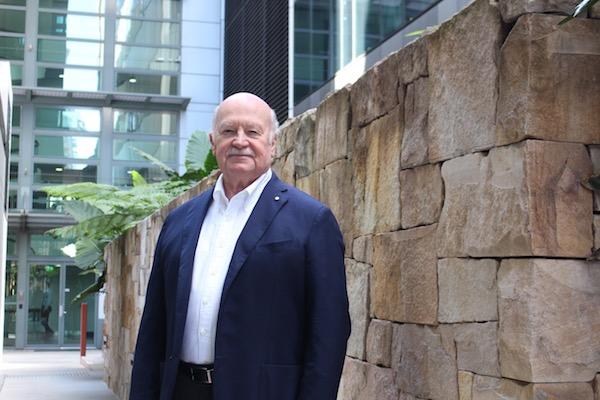For his scientific leadership and pioneering research in molecular genetics Garvan’s Professor John Shine AC, has been elected as Fellow of the Royal Society.

Credit: Garvan Institute
For his scientific leadership and pioneering research in molecular genetics Garvan’s Professor John Shine AC, has been elected as Fellow of the Royal Society.
Referred to as the ‘father of gene cloning’, Professor John Shine AC, Executive Director of the Garvan Institute of Medical Research for 21 years, laid the groundwork for genetic engineering techniques that helped launch a therapeutics industry which now benefits millions of people across the globe. His transformative genome research spans a career of 50 extraordinary years, and as Emeritus Professor at the Garvan Institute he continues his research to this day.
“To be elected to the Royal Society is a great honour. When I began my PhD, cloning genes was unheard of. To have seen basic research discoveries lead to health benefits that improve the lives of so many is truly rewarding,” says Professor Shine.
“Today, medical research is more important than ever. It is reassuring to reflect on what DNA technologies have achieved to date, as well as their enormous potential for the future.”
The Royal Society is a Fellowship of the most eminent scientists, engineers and technologists from the UK and the Commonwealth, with Fellows elected for ‘a substantial contribution to the improvement of natural knowledge, including mathematics, engineering science and medical science’. Professor Shine was elected from more than 700 distinguished nominees across the globe.
The genetic sequence that launched a biotech revolution
During his PhD at the Australian National University (ANU), Professor Shine came across a small but significant genetic sequence; five RNA nucleotides – GGAGG – that instruct bacterial cells to kick-start production of a protein.
A fascinating discovery in its own right, the ingenuity came from the application of the sequence. By attaching these five letters, today known as the Shine-Dalgarno sequence, to human genes of interest, it became possible to use bacteria as factories for producing human proteins on demand.
Equipped with the Shine-Dalgarno sequence and new sophisticated cloning methods, which he developed during his postdoctoral work at the University of California, San Francisco, Professor Shine cloned the first hormone genes, insulin and human growth hormone.
Back at ANU as a Research Fellow, he was the first to show that human hormones could be produced in bacteria, and isolated in a biologically active form.
These pioneering advancements led to some of the first medical applications of DNA and genome research. Today, all who receive therapies such as insulin, growth hormone, erythropoietin or immunotherapy, have benefitted from his research.
Ushering a new era in pharmaceuticals
In 1984, Professor Shine became Director of Research of a newly formed biotech company, California Biotechnology Inc. (Cal Bio). Later as President, he developed several major research programs aimed at treatments for congestive heart failure, infant respiratory distress syndrome, and wound healing agents.
After returning to Australia in 1987, Professor Shine became Executive Director of the Garvan Institute in 1990, a position he held until 2011. Over this time, the Institute evolved from a small offshoot of St Vincent’s Hospital into one of Australia’s major research institutes, with over 700 staff.
At Garvan, he was the key driver in several major research infrastructure initiatives. These included the establishment of Australian BioResources (ABR) and the initial development of The Kinghorn Cancer Centre – a joint translational research venture between the Garvan Institute and St Vincent’s Hospital.
Throughout this time, Professor Shine maintained his focus squarely on the translation of research discoveries into health care advances.
As Board Director and then Chairman of biopharmaceutical company CSL Ltd, between 2006 and 2018, the company grew to a leading international biopharmaceutical group with a market capitalisation of over $100 billion.
An extraordinary legacy
Professor Shine has played major roles in Australian medical research policy, the public awareness of science and innovation, and biomedical industry development, and continues his own research endeavours to this day.
At Garvan, Professor Shine heads the Molecular Genetics of Inherited Kidney Disorders Lab. With collaborators at Garvan and St Vincent’s Hospital, he recently published a new diagnostic for polycystic kidney disease, through whole genome sequencing.
“John has fostered Australian science and industry at the very highest level, from promoting skills in molecular biology, leadership of one of Australia’s first biotechnology companies to Executive Director of Garvan through its growth into one of Australia’s best medical research institutes. It is a privilege to have followed in his leadership’s footsteps and to continue to work with him today,” says Garvan Executive Director Professor Chris Goodnow.
Among many prestigious honours, Professor Shine was awarded the Boehringer-Mannheim Medal in 1980 and the Gottschalk Medal in 1982. In 2010, he was awarded the Prime Minister’s Prize for Science, Australia’s highest award for scientific research.
In 2018, Professor Shine was elected as President of the Australian Academy of Science. He joins a distinguished list of Fellows to the Royal Society, including Garvan’s Professor Chris Goodnow and Professor Johnathan Sprent.
###
Media contact:
Dr Viviane Richter
Garvan Institute of Medical Research
[email protected]
+ 61 2 9295 8128
+ 61 404 999 682
Media Contact
Dr Viviane Richter
[email protected]
Original Source
https:/




